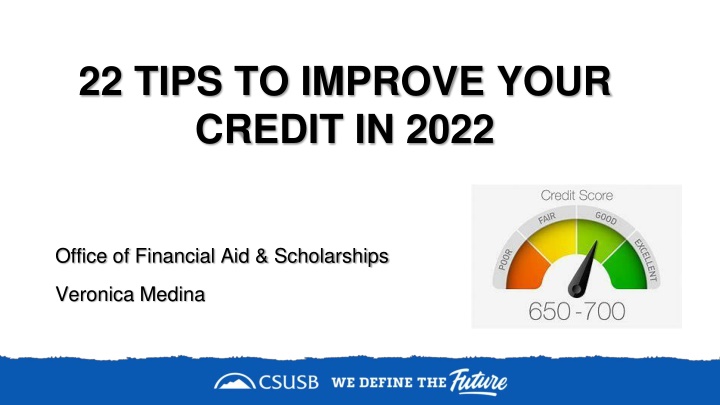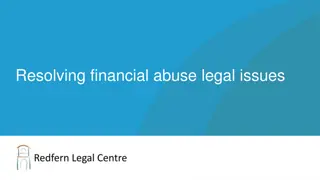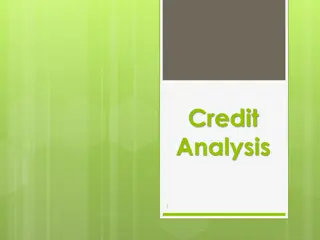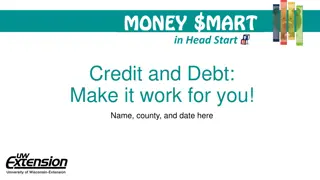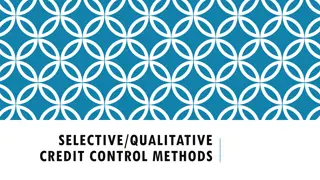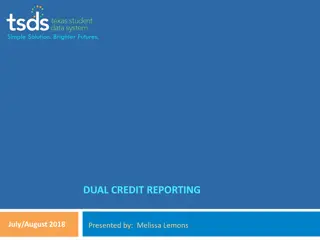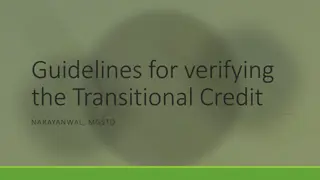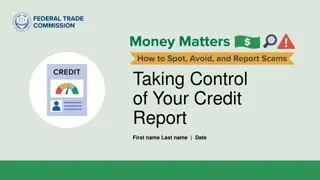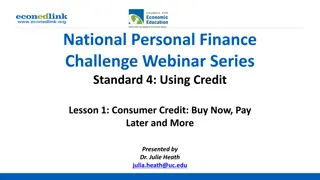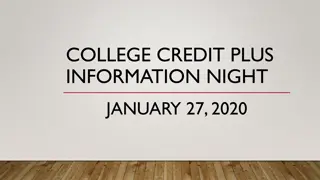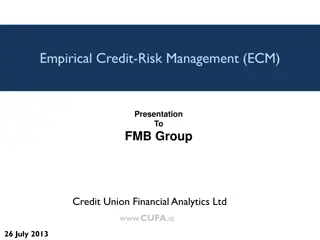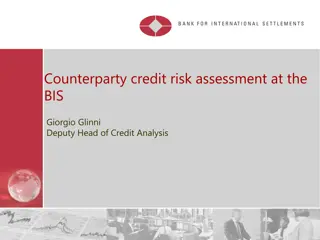Tips to Improve Your Credit in 2022
Plan to resume paying federal student loans, set up automatic bill payments, pay down balances, and handle debt in collections to improve your credit in 2022. These actions can help protect your credit score, avoid missed payments, reduce debt, and resolve collection issues, ultimately strengthening your financial health.
Download Presentation

Please find below an Image/Link to download the presentation.
The content on the website is provided AS IS for your information and personal use only. It may not be sold, licensed, or shared on other websites without obtaining consent from the author.If you encounter any issues during the download, it is possible that the publisher has removed the file from their server.
You are allowed to download the files provided on this website for personal or commercial use, subject to the condition that they are used lawfully. All files are the property of their respective owners.
The content on the website is provided AS IS for your information and personal use only. It may not be sold, licensed, or shared on other websites without obtaining consent from the author.
E N D
Presentation Transcript
22 TIPS TO IMPROVE YOUR CREDIT IN 2022 Office of Financial Aid & Scholarships Veronica Medina
Free Annual Credit Report Visit https://www.annualcreditreport.com/ to obtain your free annual report
1. Plan to Resume Paying Federal Student Loans Since March 2020, federal student loan borrowers have not had to make monthly payments, and interest rates have been set at 0% The forbearance period has been extended to May 1st, 2022 Help protect your score from the adverse effects of a missed student loan payment by making sure you understand the exact date when your loan payments come due again and reviewing your budget to determine whether the resumed payments will stretch you financially If you re concerned about your ability to afford your loans long term, talk to your servicer about signing up for an income-driven repayment plan
2. Set Up Automatic Bill Payments The best way to avoid missing a student loan or other monthly loan or credit card payment is to put your bills on autopay Make sure you have enough money in your checking account to cover each bill to avoid an overdraft When you know, you won t have to deal with a sudden score dip after a forgotten bill, you can focus on other ways to improve credit
3. Pay Down Balances The second most crucial component in your credit score is how much revolving debt you re carrying compared with your total available credit In 2020, consumers saw a reduction in average credit card balances and, subsequently, their credit utilization ratios helping lead to an average U.S. credit score that hit a 13-year high Make it a goal to reduce any high-interest credit card debt first, since that likely costs you more money in interest than, say, an auto loan or federal student loan does Decreasing your credit card balances also shows potential lenders that you re responsible with credit Experts suggest always keeping your credit utilization below 30% of your credit limit, those with the highest credit scores have a rate in the single digits
4. Handle Debt in Collections If you currently have an unpaid debt that s gone to collections, consider negotiating it down or disputing the debt if you think it s an error A debt in collections is likely more than three months past due, and either the original creditor or a debt collector may be contacting you very frequently to get its payment You have the right to request the debt collector stop contacting you, but it s in your best interest to deal with the debt: You may pay off the debt in full, or Contact the lender to negotiate a settlement amount Ignoring the debt could mean wrecked credit and potentially a lawsuit, eventually leading to garnished wages or a lien against your property
5. Get a Credit Builder Loan If you re focused on building credit from scratch or recovering after a hit to your score, a credit builder loan from a credit union could help You ll make fixed payments for 6 to 24 months, and your money will sit in a savings account you ll be able to access at the end of the loan term In the meantime, your lender will report your on-time payments to the credit bureaus, strengthening your score
6. Seek Out a Secured Credit Card Another option for building credit is to get a secured credit card It requires a cash deposit , typically around $200, which becomes your credit limit (you may provide a larger deposit for a higher credit limit) You can then use the credit card as you would any other, and the deposit protects the issuer from possibility that you won t pay off your balance If you use a secured card responsibly, your card issuer could upgrade you to a traditional unsecured card in the future
7. Join an Account as an Authorized User You can also improve credit by joining a trusted family member s or friend s credit card account as an authorized user You ll be able to use the card to make purchases, and the card s payment history will show up on your credit report That makes it crucial to pick someone whose credit you will benefit from Work with the primary cardholder to pay them for your purchases, as they ll be ultimately responsible for any balance on the card
8. Dispute Credit Report Inaccuracies You can get a free credit report from each of the three main credit bureaus at https://www.annualcreditreport.com/index.action Check them each carefully, and file a dispute with the appropriate bureau if you find something on your report you believe shouldn t be there, such as an incorrectly reported late payment You an also report the problem to the appropriate loan or credit card issuer, which may then update the information with the bureaus Fixing any issues could give your credit score a lift
9. Register for Experian Boost https://www.experian.com/consumer-products/score- boost.html Experian Boost lets you add eligible on-time phone, utility and streaming payment to your credit report, which may cause your FICO Score to rise It s free, but it will only affect your Experian credit report and scores The average Experian Boost user who sees a credit score increase improves their credit by 13 points
10. Keep Old Accounts Open Even if you no longer use an old credit card, it s typically best to keep the account open That s because your credit scores benefit from a long credit history and high total credit limit Closing established accounts will shorten the average age of your accounts and lower your total credit limit It will take years before an account closed in good standing drops off your credit report, but the effect on your credit utilization rate are immediate If a credit card comes with a high annual fee you can t afford, closing the account could be a good option or ask your issuer to downgrade the card to a no-fee version if possible
11. Limit New Lines of Credit When you apply for a new credit card or loan, a hard inquiry will appear on your credit report, possibly leading to a brief dip in your score Plan to apply only for the credit you truly need, after you ve done enough research to understand which accounts, you ll likely qualify for and avoid new loans you may have difficulty paying so you can help your credit improve
12. Apply for Loans Within a Short Time Period Lots of hard inquiries in a short time could be an indication to lenders that you re searching for lines of credit you won t be able to pay. Smart borrowers will apply for a few loans of the same type - such as a mortgage, car or personal loan to compare rates Credit scorers treat multiple hard inquiries of the same loan type made around the same time as one, reducing the negative effects on your credit score Try to submit applications within a short time frame, ideally two weeks Keep in mind that the scoring models don t offer this same allowance for credit card applications; all of these will count individually regardless of when you submit them
13. Pay Off Credit Card Balances Every Month In addition to lowering existing debt balances, minimizing ongoing debt by making it a goal to pay off your credit cards each month Zeroing out your balance each statement period keeps your credit utilization low, which is one of the best ways to strengthen credit You will also avoid incurring interest charges
14. Track Your Credit Score When you monitor your credit score, you can intervene quickly if it drops You can address factors that influence your score, such as: High balances Late payments Too many recent hard inquiries There are many ways to check and monitor your credit score for free, including through your current credit card issuer or bank, or through Experian
15. Protect Your Personal Information to Avoid Fraud Your credit can be affected by identity theft if fraudsters access your personal information to open accounts in our name To help keep your data safe, use a password manager to create and store unique passwords and avoid making financial transactions on public Wi-Fi networks, which could be vulnerable to hackers
16. Responsibly Add to Your Credit Mix Lenders look for a mix of accounts in your credit file to show that you can manage multiple types of credit These include installment loans, for which you pay a fixed amount per month, and revolving credit, which comes with a limit you can charge up to (as is the case with credit cards and home equity lines of credit)
17. Create a Budget To help pay off debt and keep your spending in check long term especially if the chaos of the past few years affected your finances take time in 2022 to make a budget This process will offer clarity on the amount you re earning and how much you can safely spend on discretionary items You ll then be more likely to make smart choices when you re tempted to use a credit card, and you can prioritize limiting your credit utilization
18. Work With a Nonprofit Credit Counseling Agency If you feel unsure about how to set up a budget or start attacking debt, a certified credit counselor at a nonprofit agency can provide a free initial consultation to discuss first steps Credit counselors also offer debt management plans, which can help some borrowers pay down overwhelming debt
19. Avoid Credit Repair Scams Some for-profit companies claim to be able to remove negative information from your credit report for a fee The truth is that no company can legally erase information from your file if it s accurate Avoid spending money on credit repair and take tried-and-true steps to improve your score instead, like lowering debt balances and paying your bills on time
20. Add Rent Payments to Your Credit Report If you regularly pay rent on time, add those payments to your credit report to boost the amount of positive information reported to the credit bureaus You can do so by signing up with a service like RentTrack - A Win-Win for Property Management Companies and Renters In many cases, getting your landlord or property management company on board will limit the fees you ll be charged
21. Get a Loan With the Help of a Cosigner Making on-time payments toward an installment loan, like making timely payments on a credit card, helps build credit history Besides using a credit-builder loan, getting a traditional one such as a car loan can add positive information to your credit report and improve your credit mix If you can t qualify for a loan on your own, a cosigner can help but make sure the cosigner knows what they are getting into If you can t afford, to repay the loan, it becomes their responsibility Only seek out a loan if you really need it, not simply to improve credit Potentially boosting your score should be a bonus or motivation, not the central reason
22. Have Patience Improving credit isn t an immediate process An excellent credit score is most often the result of years of conscientious financial behavior While some strategies will let you see small improvements quickly, joining the ranks of those with the highest credit scores will take time If 2021 brought with it new or continued financial strain after a destabilizing 2020, just commit to doing your best in 2022 and try to avoid moves that could jeopardize your credit score
Contact Informaiton Veronica Medina Financial Aid Wellness Coordinator Phone : (909) 537-3438 Office : (909) 537-5227 Fax : (909) 537-7024 Email : vmedina2@csusb.edu Website : Financial Literacy Education Programs for College Students (financialliteracy101.org) HOWL Website : HOWL Program | CSUSB
